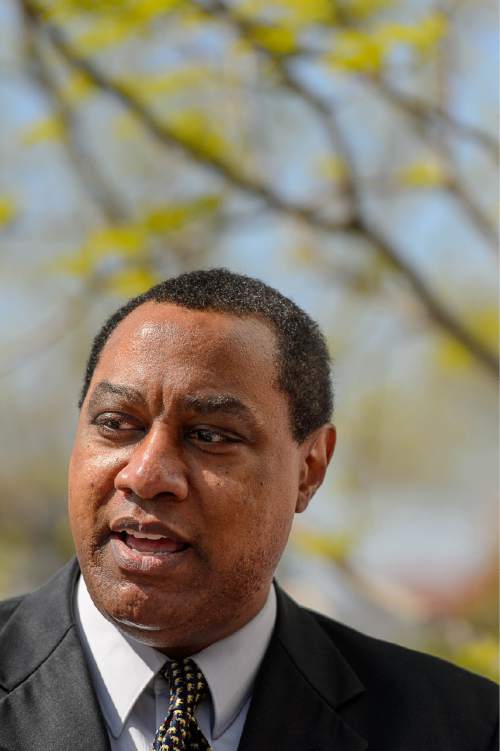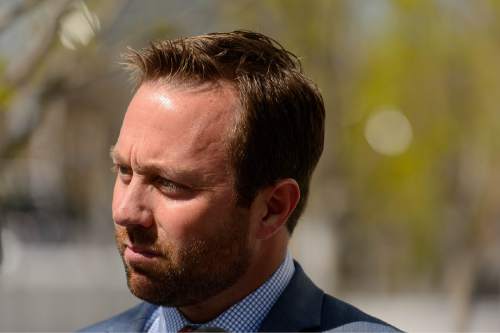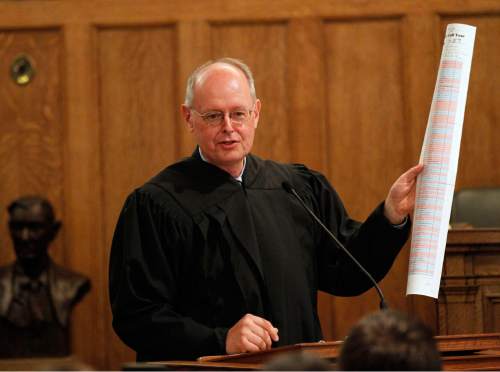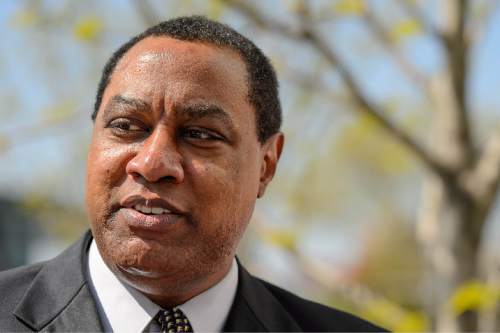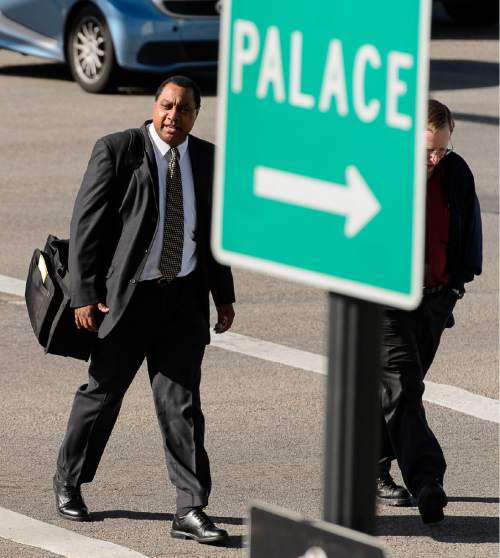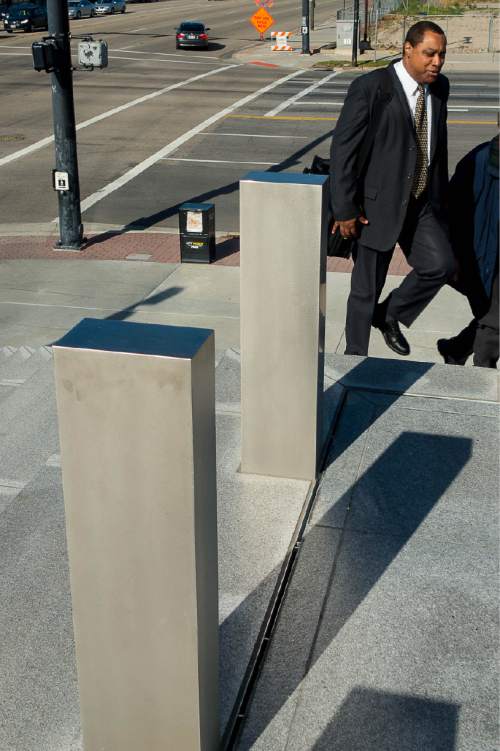This is an archived article that was published on sltrib.com in 2015, and information in the article may be outdated. It is provided only for personal research purposes and may not be reprinted.
A federal judge on Friday declined the Utah Republican Party's request to block the state's new method for nominating political candidates, finding that the law doesn't unfairly infringe on the party's rights.
"At this point there will be no injunction against the enforcement of Senate Bill 54," U.S. District Judge David Nuffer ruled from the bench after hearing nearly five hours of argument, most of it from the attorney representing the Utah GOP.
Later, Nuffer said, the party may be able to show it might be harmed by the law, but now there are paths it could take where it wouldn't be burdened and it would be premature to block the law. The trial on the party's legal challenge will still go forward and the judge has said he hopes to have the case resolved early next year.
The ruling leaves the party with a stark choice: Change its bylaws to comply with the law when delegates meet at the state party convention in August or face the prospect of not having any Republican candidates on the ballot in 2016.
State GOP Chairman James Evans said the party will consider the changes, but the decision will ultimately be up to the delegates.
In a statement to the court, Evans argued the party doesn't have enough time to adopt the required changes.
"I can state with certainty that the party cannot adopt the monumental amendments required to alter the basic structure and function of the party to make it consistent with Senate Bill 54's requirements in time to meet the deadlines imposed," he said.
Assistant Attorney General David Wolf pointed out that other parties have already made the necessary changes to comply with the law. The Utah Democratic Party has complied with the law.
Marcus Mumford, representing the Republican Party, argued that the political parties have a First Amendment right of association and should be allowed to make their own rules when they do. But in passing SB54 last year, the state required the party to make major changes to its bylaws — changes the party's governing body has repeatedly rejected.
"Our governing body has … already told us no," Mumford said.
"That's your choice," Nuffer responded.
Just because the party has refused to comply, doesn't mean it is being denied a constitutional right and doesn't exempt the party from complying with the law, the judge said.
"Laws change, regulations change all the time, why would the tradition … you have prohibit the law from changing?" Nuffer asked. "A self-imposed barrier, an internal constraint, I don't believe can create irreparable harm."
He compared it to a corporation that might be forced to change its bylaws to comply with a state law and said the state can regulate parties as long as it is done constitutionally.
SB54 was passed as a compromise between legislators and organizers of the Count My Vote movement, a group led by former Gov. Mike Leavitt and other high-profile Utahns. The group argued the existing system of letting party delegates pick candidates at their nominating conventions disenfranchised broad swaths of voters, depressed turnout and produced candidates who did not represent mainstream Utah.
Rather than simply allow candidates to get a spot on the primary ballot by gathering enough signatures from voters, as Count My Vote had sought, the bill created a dual-track system, where candidates can get to the primary ballot through the party convention or through the signature gathering.
But Mumford argued that the signature-gathering component takes away the party's ability to control which candidates represent the party and strips the party of its ability to communicate its values to voters. The party was asking the judge to enjoin the state from implementing SB54.
"It's like Princes Leia," Mumford told the judge, referring to the character in the movie Star Wars. "You're our only hope."
"Well, I am wearing a robe," Nuffer joked, but repeatedly pushed Mumford to cite court rulings to support his point, which he was unable to do to the judge's satisfaction. "I think you and I are on different points here. I'm on [Princess Leia's home planet of] Alderaan and you're on some other planet."
The ruling means the state will proceed with preparing for the new nominating process for next year's election, educating candidates, political parties and voters of the new system in place, said Mark Thomas, the state elections director.
Rich McKeown, co-chairman of Count My Vote, said the group has had confidence in the state's defense of the law and is pleased with the judge's ruling, but disappointed that the Republican Party appears to be continuing to try to overturn a law that has public support.
"They are pursuing a course that is really divisive and we think that is unfortunate at a time we ought to be trying to unify ourselves," he said.
Nuffer did express some concerns about parts of the law, specifically a provision that would require the Republican Party to allow unaffiliated voters to cast ballots in the party primary.
Wolf argued that it's a minor change, since unaffiliated voters now may join the Republican Party on Election Day and vote in the primary, then change back to unaffiliated. But Nuffer said the current law simply extends a choice to voters, while the new law would compel the party to associate with certain voters against its will.
Democratic primaries are already open to unaffiliated voters.
The judge also voiced concerns that, in a race with three or more candidates in a primary, one could win the nomination without getting more than 50 percent of the vote.
"But I don't know if I want to be the first court in the country that says plurality is a constitutional dimension," Nuffer said.
Those issues, Nuffer said, could be more fully explored as the GOP's case goes to trial.
Twitter: @RobertGehrke



